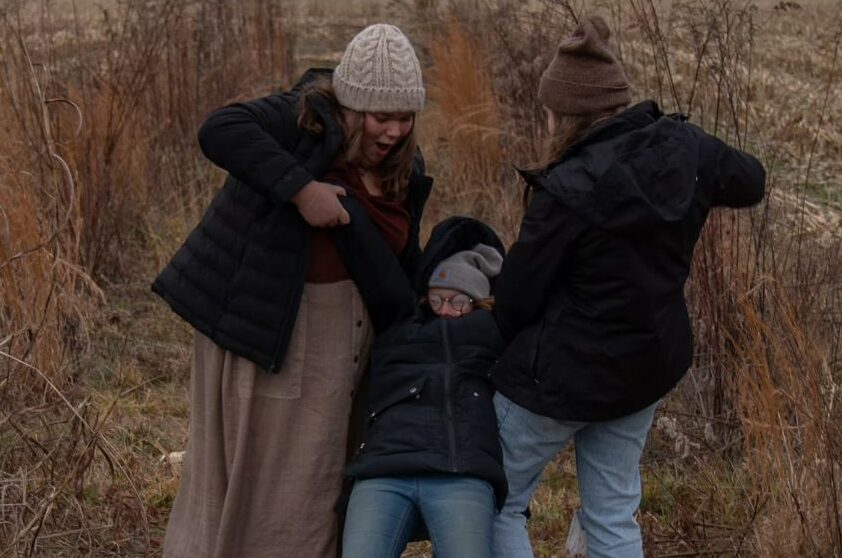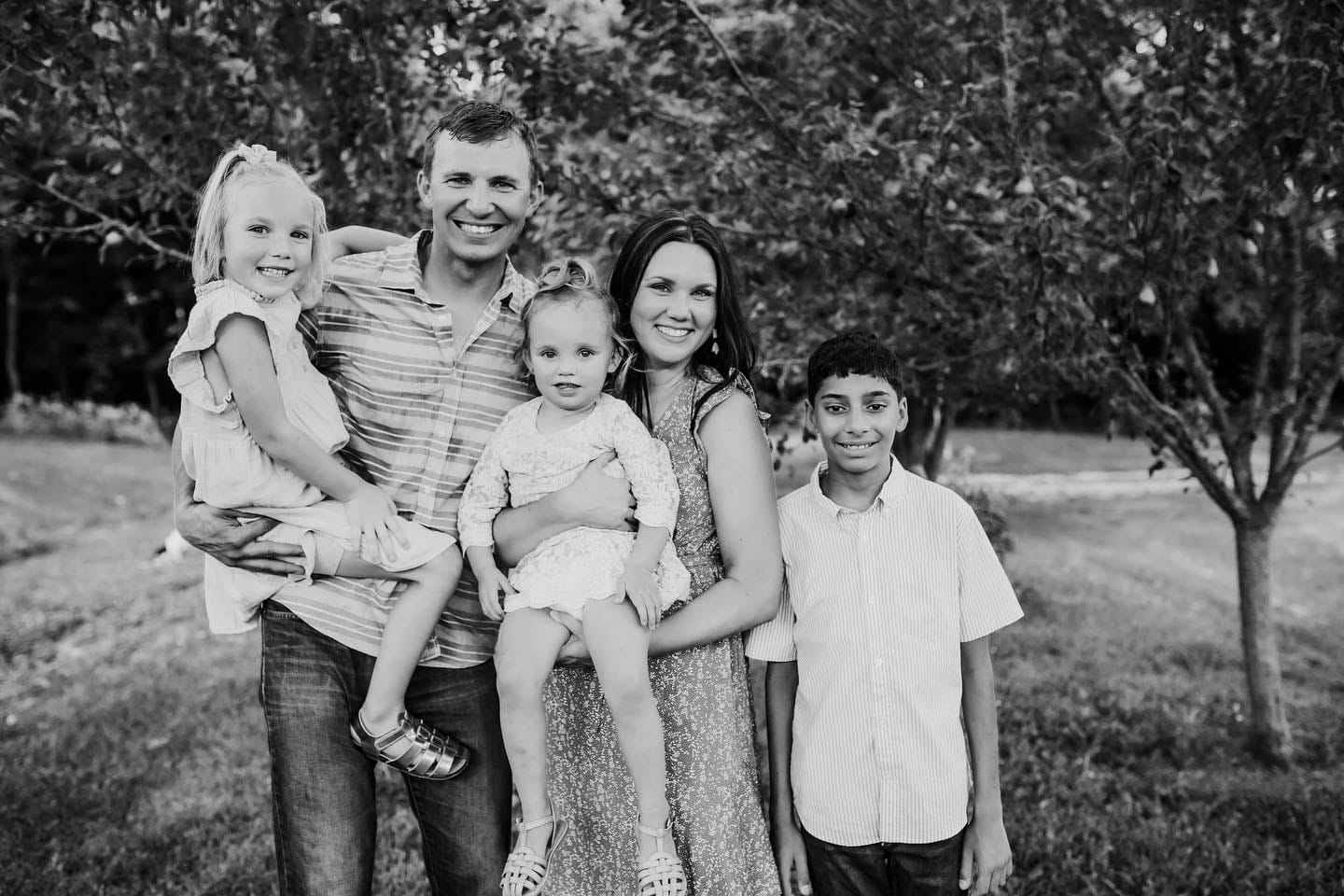Written by Melissa Corkum and Lisa Qualls
Tricia and Sam loved being parents. When they learned about the need for foster parents in their community, they talked with their kids and decided to become licensed to foster. After their first few placements, their social worker approached them about two little boys available for adoption. Tricia and Sam were thrilled to be selected as a permanent placement.
They finally had the large family they’d always dreamed of.
They knew the boys had experienced adversity in their short lives. Fortunately, they had read all of the recommended books and attended training events for adoptive and foster parents.
When the boys first arrived, it seemed everything was going pretty well, with the exception of sleep. Tricia was perpetually exhausted. As the weeks went on, things began to get worse. Her son was getting very upset over seemingly small things. His crying turned into meltdowns unlike anything she’d seen before. He became aggressive towards his siblings. Tricia felt like she had entered a war zone.
She pulled out the adoption books looking for help. She posted in a Facebook group and got lots of encouraging advice. Tricia understood her son wasn’t a bad kid. He was acting out of fear due to early adverse experiences. She knew she had to keep working hard to build trust with him and help him heal.
Tricia was working harder to parent than she ever had before. She continued to be loving toward her son even though he seemed to reject her over and over. When he was upset, he said he hated her, and it seemed to be true.
As the months passed, the angry words from her son hurt less. She became used to his verbal assaults; in fact, she seemed to let them roll off of her. She wouldn’t let them pierce her heart. When she tried to give him affection, and he pushed her away, she told herself it didn’t matter. Sometimes Tricia found herself cringing when she heard his footsteps on the stairs.
She still hoped one day everything would be better. She fed him well, participated in therapy, and met with teachers. She took good care of him, but her heart just wasn’t in it anymore. She found herself counting the years until he would graduate from high school and go away to college.
Sometimes Tricia wondered who she had become. How could a mother not like her child? Surely nobody would understand, so she kept these thoughts to herself. She felt ashamed that she just wanted him to go away.
What is Blocked Care?
Like Tricia, many parents we work with through The Adoption Connection get to this place of apathy towards their child. They still love them, but liking and enjoying them has become difficult. When we prompt parents to be honest, and they realize they can trust us, they will put words to it. But most of the time these parents stay silent and withdrawn. The shame they feel is overwhelming. This leads to isolation and feelings of despair.
One mom told us, “I once was a happy mom but now I grieve for my old life. Most of my time, energy, and thoughts are consumed by how I will survive raising this child.”
Why does this happen? Why does a mom, who loves her kids and is doing her very best, find that her heart has simply shut down toward her child?
Since both of us had experienced these confusing and discouraging feelings, we wanted to understand them more. Thankfully, we found answers rooted in brain science.
Why a Child Develops Blocked Trust
Let’s go all the way back to what children may experience before joining a family:
- Prenatal stress or harm
- Difficult labor or birth
- Early hospitalization
- Abuse
- Neglect
- Trauma
- Change in primary caregiver
A child who is exposed to any of these risk factors develops coping strategies focused on self-preservation and identifying the next potential threat. These protective behaviors may continue after joining their new family. Parents know their children are safe now, but their children do not.
These children are survivors and the skills served them well when they were unsafe. But experiencing those risk factors can activate a premature defense mechanism that may put them in a chronic state of survival, resulting in what Dr. Daniel Hughes has termed blocked trust.1
Now enter the foster or adoptive parents eager to love their new child. Their brains are primed for connection, and they continually make attempts to connect with their child and build attachment.
When there is no reciprocity of relationship and the child consistently does not respond to efforts of caregiving, parents may begin to feel ineffective and experience a sense of failure. Rejection from their child activates the defensive systems of their brain and caregiving begins to shut down. They are still meeting their child’s needs, but their heart is no longer in it.
The parent’s brain signals them that they are fighting for survival. They cannot manage complex thinking which hinders their ability to see the need behind their child’s behavior. They lose a lot of creativity and problem-solving skills, which starts a cycle of learned helplessness.
A mom wrote, “I rest some days now in where I am, yet the angst inevitably returns. Aching to like, to feel something more positive than I do, to be released to love as I was designed to love. But nothing helps—I’ve lost hope.”
Another mom said, “When he is acting out, and I am at my worst, I can hardly be in the same room with him. It is not fair to him, but I don’t know how to repair it. I never thought I would be in this position. How could anyone not like a child?”
Brain imaging has shown that the emotional experience of being rejected activates the same pattern in the brain as physical pain. When a parent approaches a child anticipating a positive response and instead gets a negative reaction, the parent may respond to the experience the same way they would respond to physical pain, by drawing away and protecting themselves.
The gut reaction a parent has to a child’s rejection is likely to grow stronger and reduce their capacity for empathy. Eventually, a parent experiences blocked care.2
Signs of Blocked Care
We’ve identified ten signs of blocked care parents may experience3:
- They are caught up in coping with their child’s behavior and lose curiosity about the meaning behind it.
- They feel defensive and guard themselves from rejection.
- They feel burned out, chronically overwhelmed, and fatigued.
- They feel resentment toward one or more of their children or their situation as a whole. They may even regret adopting or fostering.
- They feel irritable with other family and friends.
- They isolate themselves.
- They become cynical about helpful ideas.
- They feel they have lost compassion – which leads to shame.
- They experience a crisis of faith or challenge of a personal belief system.
- They do not feel real pleasure in parenting.
A mom wrote, “I don’t get as excited about things as I used to. I’m more cynical and less confident. I don’t even know if I’m capable of feeling love like I used to.”
What Parents Need to Overcome Blocked Care
Because blocked care involves the suppression of caring feelings, a parent’s community may view them as uncaring and non-empathetic. It is vital to remember that what they’re observing is not a character flaw but a treatable condition. Parents experiencing blocked care have fragile nervous systems that are closed off and protective. Even well-intentioned advice from a therapist, teacher, or friend can feel insensitive and judgmental which pushes parents deeper into the trap of shame.
How can a parent overcome blocked care and regain compassion for their child? Interestingly, they need just what their children need: nurturing. Parents need a support person to care for them, calm their defensive nervous system, and help them regulate their emotions. This person can be a professional or a support person who genuinely cares for the parent and is willing to be part of the healing process.
What parents really need is acceptance, curiosity, and radical compassion to overcome blocked care.
Acceptance is simply believing what a parent shares about how their child behaves and how they experience the child. Because of attachment challenges, a child may act differently at home than at school, therapy, or other community settings. When a parent’s experience is questioned, they tend to further withdraw into shame and blocked care. Often, parents need a safe place (without the child present) where they can speak freely about their experiences and build a compassionate understanding of their child’s defensive behaviors.4
Curiosity is different from questioning the reality of what a parent shares or trying to change their mind. It is the genuine desire to better understand the parent’s experience. Curiosity is non-judgmental and puts aside assumptions and expectations. It ultimately can help parents be more aware of their inner thoughts and emotions.
Parents need radical compassion and permission to care for themselves. All too often, parents have shelved their own needs to meet a child’s high demands resulting from trauma. Many therapeutic parenting principles require great effort, energy, and patience. A support person can encourage parents to find regular respite, go on date nights, and connect with other parents in similar situations.
A Note to Parents Experiencing Blocked Care
If you’re reading this and thinking, “Wow, this sounds just like me,” we want to assure you that you’re not alone. Even better, there are simple practices you can do to begin the process of overcoming blocked care.
You need to nurture yourself by caring for your internal world, your external world, and your relational world. By addressing these three areas of your life, you’ll begin the process of regaining compassion for yourself and your child. You may feel hope for the first time in ages.
We know how it feels to be so overwhelmed you can’t imagine adding one more thing to your life. So we created the resource we wish we would have had. It’s a gentle, self-paced course called From Apathy to Empathy: How to Regain Compassion for Your Child and Yourself.
Through daily emails, we help you understand what has happened in your brain and body, and give you simple tasks designed to keep you open to connection.
When asked what aspects of the course were most helpful, this is what some of the participants had to say:
“Before the course, I was feeling burned out and hopeless in my situation with my daughter. I felt alone and full of shame. After these 30 days, I have renewed hope! I really appreciated the short daily lessons that were manageable to read or listen to and apply immediately.”
“At the beginning, I was feeling tired and worn down and very, very negative in my thoughts. The 30-day format allowed me to absorb a little bit of information every day, ponder it, and apply it before moving on to the next thing. I am still tired and a little fearful of the future, but my negative thoughts are nearly gone.”
Conclusion
The good news is that parents can regain compassion. There is hope.
To the people reading this, you are so important. When you nurture parents you offer them a chance to heal, changing the course of their parenting journey. When a parent experiences you as a nurturing presence, their capacity to pursue their own healing and stay the course as a parent is radically increased.
And to you parents, our hearts are with you. We have walked this road and know the challenges. In fact, not much surprises us. We know there is hope for you and your family.
You are a good parent, doing good work.
References
- Hughes, D A., & Baylin, J. (2012). Brain-Based Parenting: the Neuroscience of Caregiving for Healthy Attachment. New York, NY: Norton.
- Baylin, J., & Hughes, D. (2016). The Neurobiology of Attachment-focused Therapy: Enhancing Connection and Trust in the Treatment of Children and Adolescents. New York, NY: Norton.
- Corkum, M., & Qualls, L. (2022) Signs of Blocked Care. http://www.theadoptionconnection.com/signs-of-blocked-care/
- Baylin, J. (2017). Social buffering and compassionate stories: The neuroscience of trust building with children in care. Australian and New Zealand Journal of Family Therapy, 38, 606-612.



